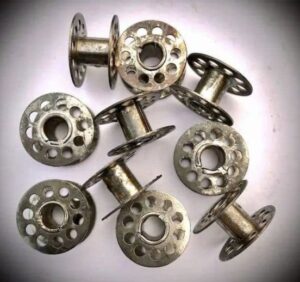In a cozy corner of your grandmother’s attic, nestled within the treasure trove of her vintage sewing kit, you might find a small collection of metallic objects that hark back to a time of meticulous handcraft and personal touch. These are thread bobbins, quintessential to the operation of a sewing machine, once as common in households as the ubiquitous smartphone is today.
The year is 1970, and these bobbins symbolize more than just components of a sewing apparatus; they are emblems of self-sufficiency and creativity. Each bobbin, with its tiny holes and hollow core, was designed to be wound tightly with thread, ready to be slotted into a sewing machine, the heartbeat of domestic creation.

Sewing was not just a pastime but a necessary skill, passed down from generation to generation. It was the art of turning a flat piece of fabric into something three-dimensional, something that could adorn a body or decorate a home. In an age before fast fashion and mass production, these bobbins helped create garments that would be worn for years, perhaps even handed down through the family.





